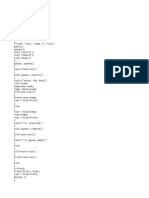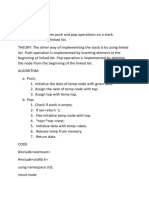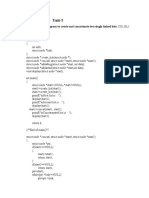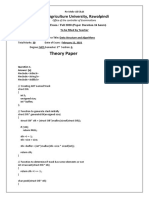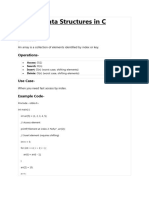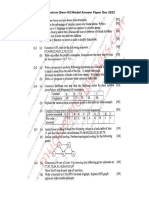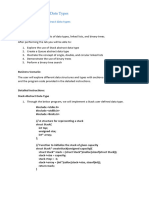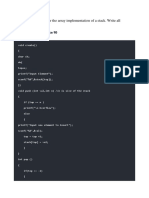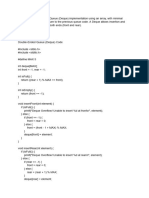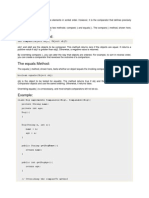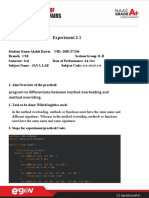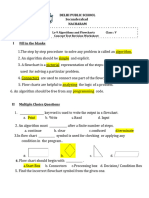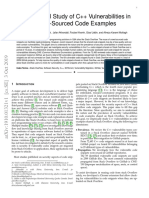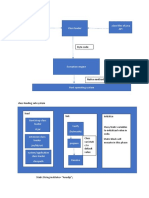Deque
Deque
Uploaded by
irinarmCopyright:
Available Formats
Deque
Deque
Uploaded by
irinarmCopyright
Available Formats
Share this document
Did you find this document useful?
Is this content inappropriate?
Copyright:
Available Formats
Deque
Deque
Uploaded by
irinarmCopyright:
Available Formats
C++ Deque
What is a deque? How to implement deques using C++?
1.
Deque is an abbreviation for double-ended queue.
2. It is a data structure in which the elements can only be added or removed from front and back of the queue. 3. A typical deque implementation support the following operations. Insert at front an element, insert at back an element, remove from back an element, remove from front an element, list the front element and list the back element. 4. Simple method of implementing a deque is using a doubly linked list.
5. The time complexity of all the deque operations using a doubly linked list can be achieced O(1). 6. A general purpose deque implementation can be used to mimic specialized behaviors like stacks and queues. 7. For example to use deque as a stack. Insert at back an element (Push) and Remove at back an element (Pop) can behave as a stack. 8. For example to use deque as a queue. Insert at back an element (Enqueue) and Remove at front an element (Dequeue) can behave as a queue. 9. Deque is also supported in C++ Standard Template Library.
EXAMPLE:- Implement a deque using doubly linked lists. #include <iostream> using namespace std; class DequeEmptyException { public: DequeEmptyException() { cout << "Deque empty" << endl; } }; // Each node in a doubly linked list class Node { public: int data; Node* next; Node* prev; };
class Deque { private: Node* front; Node* rear; int count; public: Deque() { front = NULL; rear = NULL; count = 0; } void InsertFront(int element) { // Create a new node Node* tmp = new Node(); tmp->data = element; tmp->next = NULL; tmp->prev = NULL; if ( isEmpty() ) { // Add the first element front = rear = tmp; } else { // Prepend to the list and fix links tmp->next = front; front->prev = tmp; front = tmp; } count++; } int RemoveFront() { if ( isEmpty() ) { throw new DequeEmptyException(); } // Data in the front node int ret = front->data; // Delete the front node and fix the links Node* tmp = front; if ( front->next != NULL ) { front = front->next; front->prev = NULL; } else { front = NULL; } count--; delete tmp; return ret;
} void InsertBack(int element) { // Create a new node Node* tmp = new Node(); tmp->data = element; tmp->next = NULL; tmp->prev = NULL; if ( isEmpty() ) { // Add the first element front = rear = tmp; } else { // Append to the list and fix links rear->next = tmp; tmp->prev = rear; rear = tmp; } count++; } int RemoveBack() { if ( isEmpty() ) { throw new DequeEmptyException(); } // Data in the rear node int ret = rear->data; // Delete the front node and fix the links Node* tmp = rear; if ( rear->prev != NULL ) { rear = rear->prev; rear->next = NULL; } else { rear = NULL; } count--; delete tmp; return ret; } int Front() { if ( isEmpty() ) throw new DequeEmptyException(); return front->data; } int Back() { if ( isEmpty() )
throw new DequeEmptyException(); return rear->data; } int Size() { return count; } bool isEmpty() { return count == 0 ? true : false; } }; int main() { // Stack behavior using a general dequeue Deque q; try { if ( q.isEmpty() ) { cout << "Deque is empty" << endl; } // Push elements q.InsertBack(100); q.InsertBack(200); q.InsertBack(300); // Size of queue cout << "Size of dequeue = " << q.Size() << endl; // Pop elements cout << q.RemoveBack() << endl; cout << q.RemoveBack() << endl; cout << q.RemoveBack() << endl; } catch (...) { cout << "Some exception occured" << endl; } // Queue behavior using a general dequeue Deque q1; try { if ( q1.isEmpty() ) { cout << "Deque is empty" << endl; } // Push elements q1.InsertBack(100); q1.InsertBack(200); q1.InsertBack(300); // Size of queue cout << "Size of dequeue = " << q1.Size() << endl; // Pop elements cout << q1.RemoveFront() << endl;
cout << q1.RemoveFront() << endl; cout << q1.RemoveFront() << endl; } catch (...) { cout << "Some exception occured" << endl; } } OUTPUT: Deque is empty Size of dequeue = 3 300 200 100 Deque is empty Size of dequeue = 3 100 200 300
You might also like
- - تجميع أسئلة برمجة جافا 1Document9 pages- تجميع أسئلة برمجة جافا 1malaknasser612No ratings yet
- TP - SAP - Functional Specification - Variant Report - V1.0 - TemplateDocument10 pagesTP - SAP - Functional Specification - Variant Report - V1.0 - TemplateDesperado303No ratings yet
- B or Not B: by Bill TordoffDocument3 pagesB or Not B: by Bill TordoffirinarmNo ratings yet
- IBM Assembly Language Coding (ALC) Part 1Document68 pagesIBM Assembly Language Coding (ALC) Part 1Krystal Meeth100% (7)
- Exam Seating Arrangement ProjectDocument18 pagesExam Seating Arrangement ProjectPragya Tripathi67% (9)
- DSA Lab 06 Task SP23-BCS-197 Iqra Mushtaq AhmadDocument6 pagesDSA Lab 06 Task SP23-BCS-197 Iqra Mushtaq Ahmadfairykomal993No ratings yet
- Queue Data Structure IntroductionDocument23 pagesQueue Data Structure IntroductionMark Allen GabuayNo ratings yet
- Assignment 4Document8 pagesAssignment 4Lode ChandrakanthNo ratings yet
- LAB TASK 6-Circular Queue and Implementation of Deque Using Circular ArrayDocument14 pagesLAB TASK 6-Circular Queue and Implementation of Deque Using Circular ArrayMohsin MajeedNo ratings yet
- Basic Operations: StackDocument11 pagesBasic Operations: Stackمحمد سعد کامرانNo ratings yet
- Lab ReportDocument43 pagesLab ReportSakshiNo ratings yet
- Lab 4Document8 pagesLab 4Fred NeillyNo ratings yet
- CirqularDocument2 pagesCirqularmithunmp2004No ratings yet
- Stack Queue Using LinklistDocument6 pagesStack Queue Using Linkliststdesai1005No ratings yet
- Ds WholeDocument40 pagesDs Whole2K18/CO/166 KAMAL ROHILLANo ratings yet
- Ds Whole 4,5,7,12Document26 pagesDs Whole 4,5,7,122K18/CO/166 KAMAL ROHILLANo ratings yet
- DSFILEDocument35 pagesDSFILEimgoyal2005No ratings yet
- Unit 5 Que & AnsDocument31 pagesUnit 5 Que & AnsVathyasamNo ratings yet
- Dsa FileDocument49 pagesDsa FileEva AryaNo ratings yet
- QueueDocument7 pagesQueueJanna KatrinaNo ratings yet
- Data Structures Assignment Step 2-22N238Document35 pagesData Structures Assignment Step 2-22N238rhprathish2004No ratings yet
- Queue Using Link ListDocument2 pagesQueue Using Link Listvedantb062No ratings yet
- 432 - Pract6-8 - Div ADocument21 pages432 - Pract6-8 - Div AKajal GoudNo ratings yet
- Queue CodeDocument1 pageQueue CodesaharNo ratings yet
- Number 1Document3 pagesNumber 1kim euniceNo ratings yet
- 11 Week Dsa Workshop by Geeksforgeeks: Instructor: Rahul SinglaDocument37 pages11 Week Dsa Workshop by Geeksforgeeks: Instructor: Rahul SinglamanishNo ratings yet
- Theory Paper: Arid Agriculture University, RawalpindiDocument14 pagesTheory Paper: Arid Agriculture University, RawalpindiUmair KhanNo ratings yet
- Module 5 QueueDocument22 pagesModule 5 QueueBhubon MondalNo ratings yet
- Learning Computer Programming: Wednesday, July 04, 2007Document7 pagesLearning Computer Programming: Wednesday, July 04, 2007Vishwjeet BelthariaNo ratings yet
- Codes (DSA)Document31 pagesCodes (DSA)sahilk23101No ratings yet
- Neha QueueDocument14 pagesNeha QueueNeha DasNo ratings yet
- Deque (!!!)Document5 pagesDeque (!!!)Andrew VakulyukNo ratings yet
- DS JAVA_5th Lab ProgramDocument5 pagesDS JAVA_5th Lab Programjanakirampilli70No ratings yet
- Data Structure Cheat SheetDocument29 pagesData Structure Cheat SheetNikhitha ReddyNo ratings yet
- Assn Week-2 DsDocument35 pagesAssn Week-2 Dsrhprathish2004No ratings yet
- Queue DSDocument32 pagesQueue DShaamidatksaNo ratings yet
- Program and OutputDocument69 pagesProgram and Outputpriyadharshinimr50No ratings yet
- Queue ImplementationDocument25 pagesQueue Implementationsalmamoahmmed4No ratings yet
- Project DsDocument20 pagesProject Dsashtar kazmiNo ratings yet
- DS ModuleDocument39 pagesDS ModuleÇháråñ ÇhèrryNo ratings yet
- Stack and Queue ProgramDocument13 pagesStack and Queue ProgramHj Jord TzongNo ratings yet
- Max - SizeDocument7 pagesMax - Sizesoura manNo ratings yet
- Data Structure Lecture 4 (1)Document18 pagesData Structure Lecture 4 (1)hamdymhm666No ratings yet
- DEC 2022 Data Structure SolutionDocument18 pagesDEC 2022 Data Structure SolutionKranti GajmalNo ratings yet
- Index: Polynomial Evaluation Using Structure (With C++ Program) Stack Pop and PushDocument42 pagesIndex: Polynomial Evaluation Using Structure (With C++ Program) Stack Pop and PushSachin koreNo ratings yet
- Ads Lab 26th July 2016 11pmDocument26 pagesAds Lab 26th July 2016 11pmAamer SohailNo ratings yet
- Lesson 7 LabDocument19 pagesLesson 7 LabMangilal BishnoiNo ratings yet
- Queues_074826Document26 pagesQueues_074826nailapp2023No ratings yet
- Data Structure Unit 2 Important QuestionsDocument48 pagesData Structure Unit 2 Important QuestionsYashaswi SrivastavaNo ratings yet
- Daa Exp-4Document10 pagesDaa Exp-4War LockNo ratings yet
- Activity4 1341Document14 pagesActivity4 1341maryammunawar110No ratings yet
- RE - Lab Program 1 To 4Document7 pagesRE - Lab Program 1 To 4vijipersonal2012No ratings yet
- DSA Practical Codes - 122436Document16 pagesDSA Practical Codes - 122436Har JadNo ratings yet
- QueueDocument6 pagesQueueDhruv SompuraNo ratings yet
- DequeueDocument4 pagesDequeuepremsrnvsNo ratings yet
- DS HA-2 SolutionsDocument9 pagesDS HA-2 SolutionsV SUBRAHMANYAMNo ratings yet
- Assignment # 2 DSA LabDocument10 pagesAssignment # 2 DSA Labfairykomal993No ratings yet
- Module 2Document29 pagesModule 2bhatpratham54No ratings yet
- 23-NTU-CS-1170(lab 6)Document14 pages23-NTU-CS-1170(lab 6)mahaather45No ratings yet
- Ds Exp 8 To 11Document21 pagesDs Exp 8 To 11jiyadublaNo ratings yet
- Khufiya DocDocument19 pagesKhufiya DocsparenileshNo ratings yet
- Program:: #Include Using Namespace STDDocument19 pagesProgram:: #Include Using Namespace STDAnonymous sxxT5ovE1No ratings yet
- Data Structure Lab ManualDocument25 pagesData Structure Lab Manualshiva974053No ratings yet
- ds 12Document9 pagesds 12Nisha Anil KadamNo ratings yet
- Conversie Zecimal Impachetat - Binary (Bcdbin)Document1 pageConversie Zecimal Impachetat - Binary (Bcdbin)irinarmNo ratings yet
- Russell & Norvig Ch. 5: - Constraint Satisfaction Offers A Powerful Problem-Solving ParadigmDocument20 pagesRussell & Norvig Ch. 5: - Constraint Satisfaction Offers A Powerful Problem-Solving ParadigmirinarmNo ratings yet
- Conversie Din Binar (16 Biti) in Zecimal Neimpachetat/impachetat (Binzn/binbcd)Document1 pageConversie Din Binar (16 Biti) in Zecimal Neimpachetat/impachetat (Binzn/binbcd)irinarmNo ratings yet
- The Compare Method:: Sorted OrderDocument3 pagesThe Compare Method:: Sorted OrderirinarmNo ratings yet
- Inorder Traversal AlgorithmDocument9 pagesInorder Traversal AlgorithmirinarmNo ratings yet
- Împartirea A Doua Numere, Zecimal Neimpachetate Pe 16 Biti (Divzn16)Document2 pagesÎmpartirea A Doua Numere, Zecimal Neimpachetate Pe 16 Biti (Divzn16)irinarmNo ratings yet
- Are We in Danger of Running OutDocument1 pageAre We in Danger of Running OutirinarmNo ratings yet
- The Graph Data Structure: Mugurel Ionu Ț AndreicaDocument13 pagesThe Graph Data Structure: Mugurel Ionu Ț AndreicairinarmNo ratings yet
- A Fast Method For Accessing Nodes in The Binary Search TreesDocument8 pagesA Fast Method For Accessing Nodes in The Binary Search TreesirinarmNo ratings yet
- Linear Programming For The Premier League Fantasy FootballDocument27 pagesLinear Programming For The Premier League Fantasy FootballLuke Mathew0% (1)
- CGNS TutorialDocument20 pagesCGNS Tutorialhenry fordNo ratings yet
- Unit 1 Decision Making and BranchingDocument18 pagesUnit 1 Decision Making and BranchingDIVYANSHI PHOTO STATENo ratings yet
- Experiment 2.1: Program To Differentiate Between Method Overloading and Method OverridingDocument4 pagesExperiment 2.1: Program To Differentiate Between Method Overloading and Method OverridingAkshit RawatNo ratings yet
- Wiring in WebdynproDocument14 pagesWiring in WebdynprojitendrayadavcsNo ratings yet
- One Network JD - Sr. Jr. Software Engineer (Java)Document1 pageOne Network JD - Sr. Jr. Software Engineer (Java)ronak shahNo ratings yet
- Discrete Hartley TransformDocument7 pagesDiscrete Hartley Transformbesty666No ratings yet
- Motivational Letter For Masters - PDF - Computer Science - EngineeringDocument1 pageMotivational Letter For Masters - PDF - Computer Science - EngineeringTawanda Isaac NyagumboNo ratings yet
- Lecture 9 Prolog ProgrammingDocument53 pagesLecture 9 Prolog ProgrammingRahma FarazNo ratings yet
- CL-5 Computer CCT Revision WS (KEY)Document2 pagesCL-5 Computer CCT Revision WS (KEY)Anonymous vr1l9YlnsNo ratings yet
- Lab2b - iLED Extending To C PDFDocument15 pagesLab2b - iLED Extending To C PDFjavierNo ratings yet
- DXC - MF - SD - 2267306 - S4TWL - SD Simplified Data ModelsDocument4 pagesDXC - MF - SD - 2267306 - S4TWL - SD Simplified Data ModelsShashi Dhar SNo ratings yet
- Oracle QueriesDocument19 pagesOracle QueriesRam KrushnaNo ratings yet
- PerceptiLabs Fact SheetDocument6 pagesPerceptiLabs Fact Sheetfx0neNo ratings yet
- An Empirical Study of C++ Vulnerabilities in Crowd-Sourced Code ExamplesDocument14 pagesAn Empirical Study of C++ Vulnerabilities in Crowd-Sourced Code ExamplesThadeus_BlackNo ratings yet
- Bit BakeDocument32 pagesBit Bakedeweyev699No ratings yet
- Scratch Programming TutorialDocument19 pagesScratch Programming TutorialhydraNo ratings yet
- 2 - Ao Ks KeiDocument3 pages2 - Ao Ks KeimychelriosNo ratings yet
- JVM ArchitectureDocument4 pagesJVM ArchitecturePavan ReddyNo ratings yet
- Mini Projec1Document44 pagesMini Projec1RamanNo ratings yet
- 6.828 Fall 2012 Lab 2: Memory Management: Getting StartedDocument8 pages6.828 Fall 2012 Lab 2: Memory Management: Getting StartedAhmed fattoumNo ratings yet
- Anna University: Chennai - 600 025Document7 pagesAnna University: Chennai - 600 025Vicky FrescoNo ratings yet
- Eric Mikida Fall 2011Document34 pagesEric Mikida Fall 2011Avantika GuptaNo ratings yet
- Ladder DiagramDocument21 pagesLadder Diagrammahesh4975No ratings yet
- 8 Data Address GeneratorDocument14 pages8 Data Address GeneratorAzizur RahmanNo ratings yet












